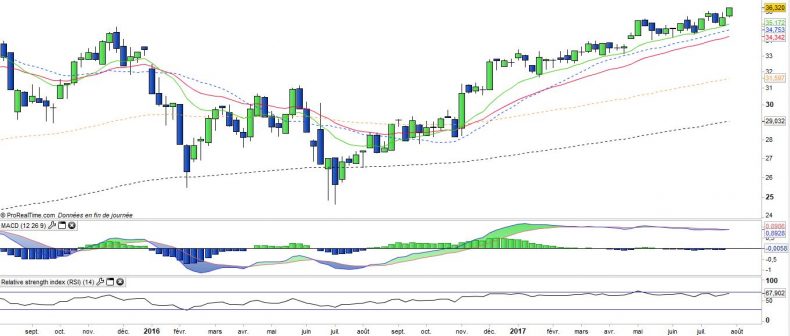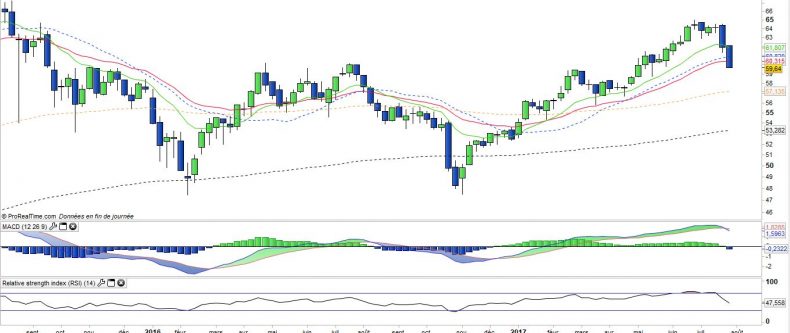Markets confirmed this week some decorrelation / fragmentation among the major indices.
First of all in the US, as the Dow Jones 30 continues its progression mainly driven by 3 stocks (Apple, Nike and Intel) that allow it to set a new historical record and break the 22000 pts level, while the Nasdaq and The S & P500 remained stable. The US indices remain firm, supported by the weakness of the dollar and 10-year rates, as well as solid corporate results overall above expectations and solid economic indicators (ISM, purchasing indicators, unemployment).
In Europe, the wait-and-see attitude prevailed this week until the monthly unemployment report release that was well above expectations and boosted both USD and rates, but also the Stoxx600 which ultimately increased by 1,17%, while so far good corporate results offsetting fears about the appreciation of the euro, which reached 1.19. The Bank of England maintained its key rate at 0.25% while lowering its growth forecast from 1.9% to 1.7% due to the looming negative impacts of the Brexit on consumption and investment, which in turn led to a sharp increase in the Euro versus Pound to the 0.90 level.
In addition, the Yen continues to appreciate steadily against the dollar. The major developments are therefore currently taking place mainly in the foreign exchange market, with a globally lower dollar and an ever stronger Euro against major international currencies. Commodities and emerging countries are benefiting from the weakening of the dollar, but this could ultimately translate into a positive effect on US corporate profits and negatively on their European competitors. A typical example is the comparative evolution of Boeing (+ 22% in July) and Airbus (-2%), while these two companies are very sensitive to the evolution of the Euro / Dollar.
Interest rates have for now stopped their progress, and have even marked the pace this week without penalizing the financial sector, but what has benefited in contrast to the Utilities sector.
Europe Insurance (INS) : weekly data
Among the big losers of the week, there is still the health sector in Europe as well as the US, while the future of the reform of the American health system continue to darken after the failure of the congress of the attempt to partially repeal the Obamacare.
Healt Care Services US (XHS) : under pression again
Macroeconomics is expected to remain at the forefront in the coming weeks, and central bank interventions will be monitored very closely.
Retrouvez-nous désormais sur https://phi-advisor.com/fr/
pour bénéficier de nos signaux d’achat et de vente de plus de 300 ETFs !
Nous utilisons des cookies pour vous garantir la meilleure expérience sur notre site. Si vous continuez à utiliser ce dernier, nous considérerons que vous acceptez l'utilisation des cookies.Ok
Markets confirmed this week some decorrelation / fragmentation among the major indices.
First of all in the US, as the Dow Jones 30 continues its progression mainly driven by 3 stocks (Apple, Nike and Intel) that allow it to set a new historical record and break the 22000 pts level, while the Nasdaq and The S & P500 remained stable. The US indices remain firm, supported by the weakness of the dollar and 10-year rates, as well as solid corporate results overall above expectations and solid economic indicators (ISM, purchasing indicators, unemployment).
In Europe, the wait-and-see attitude prevailed this week until the monthly unemployment report release that was well above expectations and boosted both USD and rates, but also the Stoxx600 which ultimately increased by 1,17%, while so far good corporate results offsetting fears about the appreciation of the euro, which reached 1.19. The Bank of England maintained its key rate at 0.25% while lowering its growth forecast from 1.9% to 1.7% due to the looming negative impacts of the Brexit on consumption and investment, which in turn led to a sharp increase in the Euro versus Pound to the 0.90 level.
In addition, the Yen continues to appreciate steadily against the dollar. The major developments are therefore currently taking place mainly in the foreign exchange market, with a globally lower dollar and an ever stronger Euro against major international currencies. Commodities and emerging countries are benefiting from the weakening of the dollar, but this could ultimately translate into a positive effect on US corporate profits and negatively on their European competitors. A typical example is the comparative evolution of Boeing (+ 22% in July) and Airbus (-2%), while these two companies are very sensitive to the evolution of the Euro / Dollar.
Interest rates have for now stopped their progress, and have even marked the pace this week without penalizing the financial sector, but what has benefited in contrast to the Utilities sector. Europe Insurance (INS) : weekly data
Among the big losers of the week, there is still the health sector in Europe as well as the US, while the future of the reform of the American health system continue to darken after the failure of the congress of the attempt to partially repeal the Obamacare. Healt Care Services US (XHS) : under pression again
Macroeconomics is expected to remain at the forefront in the coming weeks, and central bank interventions will be monitored very closely.